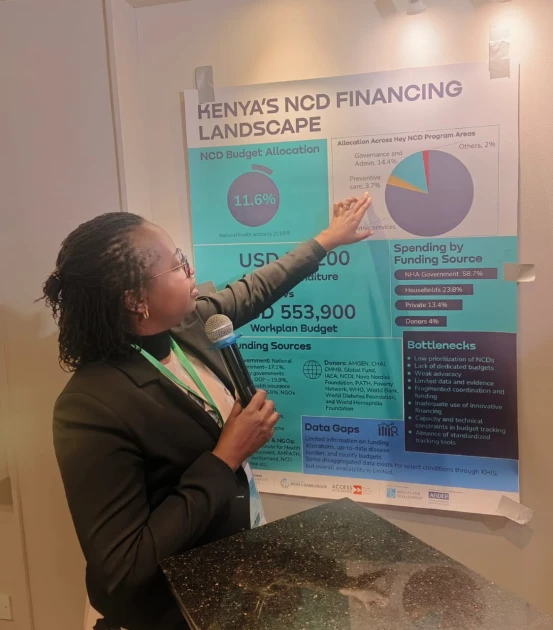Africa urged to prioritize domestic financing for Noncommunicable Diseases

Dr. Gladwell Gathecha, Deputy Head of NCDs at Kenya’s Ministry of Health, representing the country at the Financing Accelerator Network for NCDs meeting in Nairobi.

Audio By Vocalize
The World Health Organisation (WHO) estimates that NCDs account for 74% of global deaths and 84% of premature deaths in low- and middle-income countries. In Africa, the burden has been rising steadily since 2017.
At a stakeholders’ meeting in Nairobi that brought together researchers, policy experts, and health financing specialists from seven African countries, participants stressed that sustainable domestic financing is the only way to ease the growing NCD burden.
“Domestic resource mobilization is more than just raising funds—it is about aligning those funds with national priorities and ensuring they are spent efficiently,” said Dr. Jackson Otieno, senior research and policy analyst at the African Institute for Development Policy (AFIDEP). “By putting domestic resource mobilization at the center of health financing, African countries can secure long-term, predictable funding for NCDs and reduce dependence on external aid.”
A report by Kenya’s Ministry of Health (MoH) shows that in the 2018/2019 financial year, only 11.6% of the national health budget was allocated to NCDs. Nearly 80% of the budget went to curative services, with just 3.7% earmarked for preventive care. In the 2024/2025 fiscal year, the recurrent treasury allocation to NCDs was only USD 78,000 against a work plan of USD 555,900.
Dr. Gladwell Gathecha, Deputy Head of the MoH’s NCD Division, acknowledged the persistent challenges. “NCD financing in Kenya faces numerous bottlenecks, including limited data and evidence, lack of dedicated budget capacity, and technical constraints in budget tracking,” she said.
Experts at the Financing Accelerator Network for NCDs (FAN) meeting further highlighted the inequities caused by heavy out-of-pocket spending.
“We must invest in prevention and early treatment of NCDs rather than wait until people are terminally ill—that is like supervising death,” said Dr. Rose Oronje, AFIDEP’s Deputy Executive Director.
Currently, Kenya’s health system is financed through national and county governments, social health insurance, and development partners. However, households still shoulder nearly a quarter of the costs.
The two-day cross-learning workshop was attended by experts from Kenya, Somalia, Uganda, Rwanda, Malawi, and Ghana, who shared strategies to strengthen health financing and reduce reliance on donors in combating NCDs.


Leave a Comment